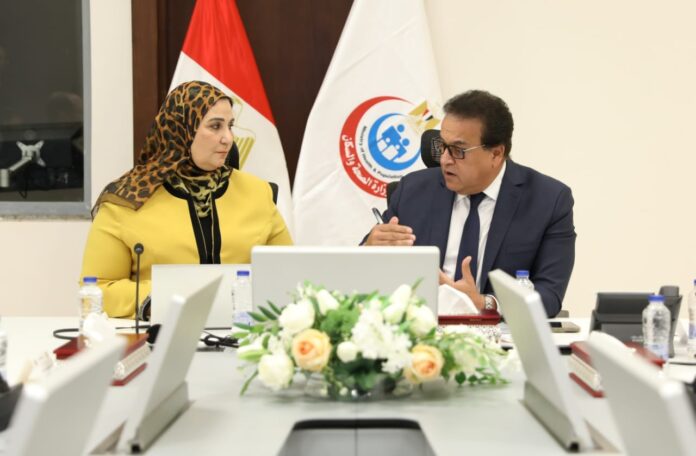
Cairo, Egypt: The Minister of Health, Population, and Social Solidarity discuss joint cooperation to integrate health and social services for citizens, according to the official update by the government.
Abdul Ghafar and Al-Qabaj seek to facilitate the extraction of the integrated services card, linking the marriage prospect examination initiative and the “Mouda” programme to maintain the existence of the Egyptian family, integrate child support services and the mechanism of cooperation with family associations.
According to the update, Dr Khaled Abdul Ghaffar, Minister of Health and Population, and Nivin Al-Qabaj, Minister of Social Solidarity, held a meeting on Wednesday evening to discuss the aspects of mutual cooperation between the two ministries to ensure integration of health and social services for citizens of Egypt.
The meeting included a review of joint cooperation files within the Social Health Protection Network for Citizens, where cooperation in health services provided to different categories and ages served by both ministries through different programs, including the First Thousand Day Program, Affection, 2 Enough Programs, Integrated Services Card for Persons with Disabilities, and Health Conditional were discussed.
As per the official statement, mothers and children benefitting from “Takafel” cash support, the protection of children under a uniform system, as well as the positive parenting program and the provision of health and psychological services for children and the elderly in care institutions, as well as cooperation in relief and healthcare services in the Egyptian Red Crescent and other health services organizations.
The Minister of Health and Population pointed out the importance of cooperation between the “Mouda” program and the President’s initiative to examine prospective marriage prospects by utilizing the database of the presidential initiative to determine categories targeted by health awareness and education, emphasizing the need to integrate health, social and educational services to protect and invest in Egyptian families.
Accordingly, Dr Khaled Abdel-Ghaffar emphasized the importance of continuous cooperation and coordination between rural leaders of the Ministry of Health and Population and social leaders of the Ministry of Solidarity and their 15,000 leaders to achieve integration in awareness of services provided to citizens within health and social care programs.
Dr Khaled Abdel-Ghaffar stressed the importance of quickly completing the networking between the ministries of health, population and social solidarity of the Integrated Services Cards organization. The two sides discussed the mechanisms of coordination and cooperation regarding medical examinations for persons with disabilities within the second phase of the Integrated Services Card.
According to the reports, the meeting also discussed the health care file for children in social care roles, as well as the filing system facility for children found in shelter roles; both sides agreed to allocate a health office within the National Bail Center to facilitate the extract of papers and health certificates for children and to get the necessary vaccinations.
The meeting also addressed the issue of approving and expanding “2 are enough” clinics to promote reproductive health services in areas with service gaps or indirect services, to maximize the efforts to regulate and develop the Egyptian family.
The parties reaffirmed the joint cooperation in the delivery of healthcare services to mothers and children beneficiaries of cash support “Takafel and Dignity”, emphasizing the importance of reproductive health for the beneficiaries of equality in all regions, especially in rural areas, healthcare for children under the age of 6 to check the completion of the vaccination schedule, child nutrition and growth, and early detection of disability, And his protection against all diseases in the first day and in early childhood.
For her part, Nevin Al-Qabaj, Minister of Social Solidarity, said that the ministries of Social Solidarity and Health and Population put together many integrated programs, especially that Social Solidarity addresses issues of quality of life of poor families under the poverty line integrated to provide a package of services that they qualify for a generous living standard, and invests in her children visually enhancing good investment in social capital, according to the update.
Qabaj discussed the network interconnection between the two ministries to facilitate instant data circulation, especially the data of pregnant women, newborns, persons with disabilities, guaranteed children, and beneficiaries of equality and dignity, as the speed of circulation and distribution of social health data at all levels contributes to the access of services and benefits to their beneficiaries, and guides the use of state resources in the future Right.
The Minister of Social Solidarity has also emphasized the importance of coordination with regard to the private societies provided for health services which are under the umbrella of the Ministry of Social Solidarity but receive their technical credentials from the free treatment sector of the Ministry, indicating that around 30% of citizens receive health services from private societies Village level and hunger.
Therefore the importance of linking the services of these associations with the services of the Ministry of Health, including intensive care families, kidney wash machines, nurseries, oncology centres and other services, was pointed out.
Qabaj added that Health and Population have a role in promoting the physical and mental health of children and the elderly in social care wards and in homeless adult institutions, seeking support from Health and Population in preparing updated and facilitated health files for all care residents, and stressed the importance of cooperating with the General Secretary for Mental Health, on Psychological support for certain categories that can be a threat to themselves and their peers at the same time.
The experience of collaboration between the General Mental Health Trust and the Anti-Addiction Fund has had a concrete positive impact, which is required in all care services.
The important role of Zakat committees in Nasser Social Bank spread across the republic with a total of 3600 committees was pointed out, and their support to a number of hospitals, prescriptions and medical clinics, such as Abu Al-Rish Children’s Hospital, Oncology Hospital, Ain Shams Specialist Hospital, and several tribal hospitals are currently being reinforced. The committees, by reshaping their boards and agencies, unifying and linking their databases to the Ministry of Social Solidarity.
Al-Qabaj thanked the Minister of Health and Population for his support in unifying the bail system, including the program “Mouda” for the presidential program for medical examination for prospective couples, and relying on one system to stabilize disability and the program “Dignity” and the availability of birth and disability data until the full network interconnection between the two ministries, and Al-Qababaj Abdul Ghafar promised to support the primary care units, 1000 units, with computer devices. Automation to facilitate the transaction of data, funded by the Ministry of Social Solidarity and Nasser Social Bank.
The message by Ministry further claimed that the two ministries have agreed to contract a joint workshop with the health services associations to coordinate work and govern procedures and maximize the utilization of all resources for the benefit of the Egyptian citizen, especially the first in care.

